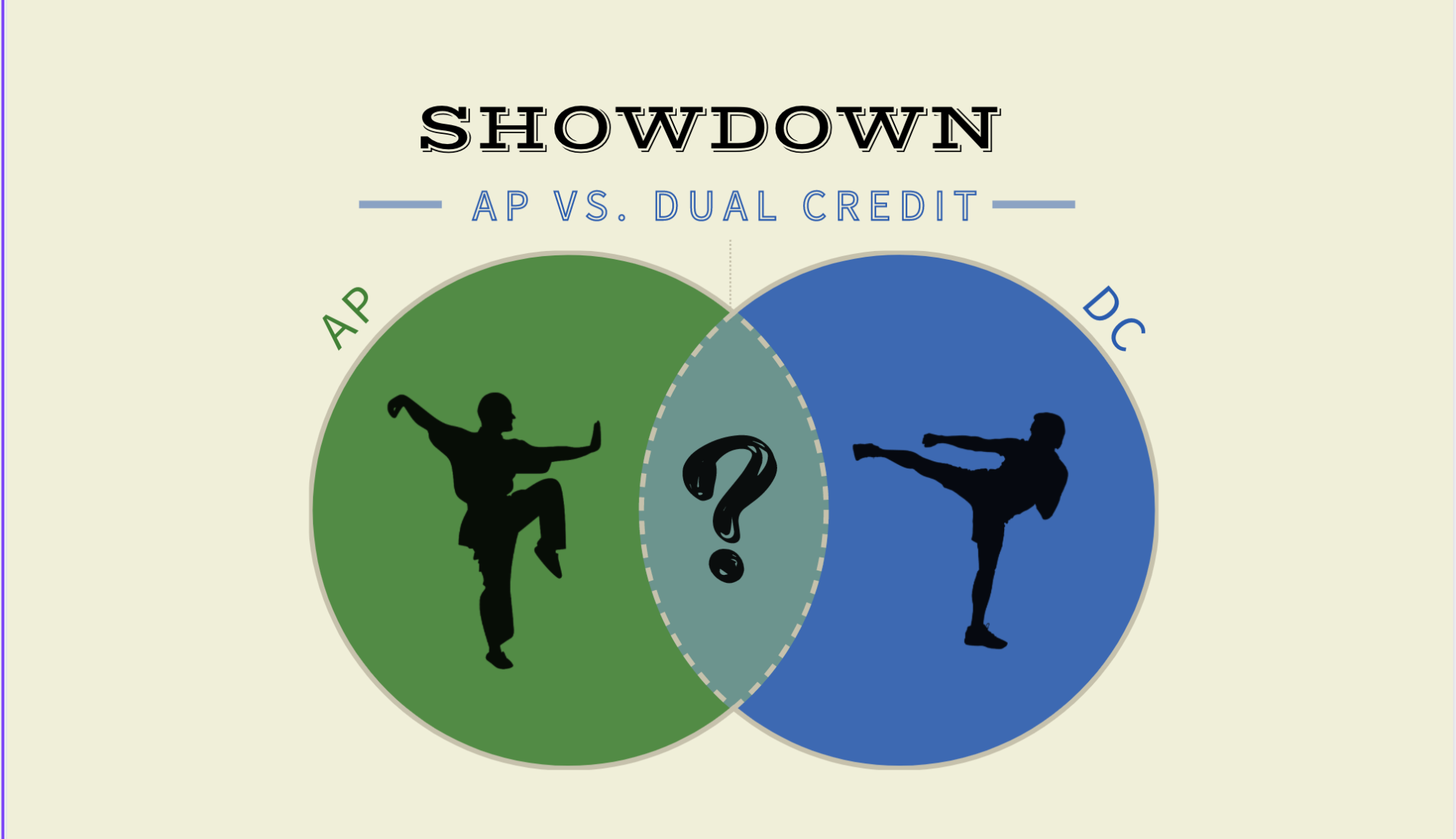
Column: Which is better – AP or dual credit classes?
Prosper ISD offers a variety of Advanced Placement classes to high school students. At the end of the year students have the option to take College Board AP subject tests. Depending on their score they may be able to receive college credit
Getting College Credit: Since AP tests are nationally standardized, most colleges in the US reward credit for AP courses. AP tests are scored on a five-point scale, with one being the lowest score and five being the highest. A score of three is generally considered passing, but many colleges require a four or five to award credit. Depending on the school, you might also get more credit hours for better scores. Schools usually have a list of the AP classes they accept along with the score cutoff to receive credit on their website. You can also use College Board’s AP Credit Policy Search to search the score cutoff for any AP course at any college. Additionally, some colleges restrict the amount of AP credits they will award per student. If a college accepts your AP test scores, you will usually receive between one and four credit hours, depending on the school and program.
Cost: Most AP tests cost $98, with a $40 late registration fee. Low income students can apply for scholarships to get the test fee waived. You may also want to purchase additional study materials or test prep books, but any required textbooks or course materials will be provided by PHS.
Length: Most AP classes are year-long classes, compared to semester-long dual credit courses. AP classes run on the same schedule as the rest of the school, and you still have to go to class after you take the test in May. However, Prosper ISD allows AP teachers to forego giving final exams, since students are already taking the AP test at the end of the year.
Difficulty: PISD weights both AP and dual credit classes as a 6.0 maximum when calculating a student’s GPA. However, AP classes tend to be much more difficult. Some colleges prefer AP classes when evaluating a student’s high school course rigor, while others treat AP and dual credit as equally rigorous. AP classes also have a much more standardized curriculum and a huge variety of study resources.
Prosper ISD partners with Collin College to offer high school students the opportunity to take introductory level college classes and receive both high school and college credit.
Getting College Credit: For dual credit, there is no standardized test you need to pass to get college credit; you just have to pass the class. Your final grade goes on both your high school and college transcript. the Texas Common Core system assigns each course a code. For example ‘Composition 1’ is coded as ENG 1301 at every public school in Texas. This makes it easy to transfer credits between schools. Out of state or private universities will usually evaluate dual credits on a case-by-case basis. Ivy league schools do not accept dual credit (although they don’t accept many AP credits either)
Cost: Dual credit classes cost about $250 per semester, and you may also be asked to purchase textbooks. However, dual credit students get the same perks as Collin College students, such as free access to Collin College online library databases, campus libraries and lab materials, free Grammarly premium, free access to the writing center, free tutoring, free mental health services, and student discounts for many stores and services.
Length: Dual credit classes are semester-long classes. Most award three credit hours per semester. Dual credit classes operate according to Collin College’s schedule, so classes start around the end of August and end at the beginning of December. This means that dual credit students get 1-2 weeks off at the beginning and end of each semester. Additionally, most dual credit classes only meet twice a week, and students don’t have to come to class on Fridays.
Difficulty: Dual credit classes tend to be much easier than their AP counterparts, while still having the same effect on GPA. Usually, there’s less homework, easier tests, and more extra credit opportunities than in an AP course. However, there is much more variability and it is harder to find study materials, since they are less standardized and individual professors have a lot of control over the syllabus. You will also have to pass a Texas Success Initiative test or have a waiver, which you will receive if you have high enough scores on the STAAR, PSAT, or other standardized test, before you can enroll in a dual credit course.
- No matter what type of course you take you should check the policies of the colleges and majors you are interested in to see if you will get credit
- Some schools will accept dual credit or AP credits, but they will count as elective credits, not towards your major (this varies a lot depending on school and major)
- Both options are much cheaper than traditional college classes. AP tests cost $98, while dual credit classes cost roughly $200-300. The average cost for a 3 hour class in college is $1800-$3000.
- Both dual credit and AP classes look good when colleges are evaluating course rigor, and getting good grades in either type of class can significantly boost your class rank and weighted GPA.
- Both classes are more difficult than on-level or honors classes, and if you do not get good grades, it can lower your unweighted 4.0 GPA.
- Dual credit transfers best to public, in-state universities.
- Credit transfer depends on your school and major.
- If you plan to go to an Ivy league you should take college-level classes to be competitive for admissions, but they are unlikely to accept AP credits, and do not accept dual credit.
- 3 is the lowest AP test score colleges will award credit for, but many schools only award credit for scores of 4 or 5
- To receive credit for a dual credit course you just need to pass the class with a C or above
- Dual credit classes start later and end earlier than regular high school classes. Dual credit students usually get Fridays off too.
- Dual credit is usually easier than AP, but the course material is less standardized and more is left up to the professor.
- Dual credit students get the same perks as Collin College students, which include many free services and student resources.
Hi! I’m Tess Gagliano, a senior at PHS. During my high school years I’ve taken six AP classes and ten dual credits. My verdict? Dual credit wins hands down. It is more expensive than AP, (although still cheaper than college classes). But, not having to take an AP test alleviates so much stress. Not to mention, the classes themselves are so much less stressful. My professors have all been very nice, and besides reading the textbook and an occasional essay, I had virtually no homework for any of them. The late start and early finish gave me some extra free time, and made it so my finals weren’t all stacked on top of one another. I had about two weeks after my dual credit finals to study for my midterm tests in other classes. Plus, not having class on Friday was a huge perk. I’ve fully utilized some of the other perks that come with being a Collin College student. I get student discount rates on Spotify, Hulu, and at the Apple store. I use Grammarly Premium for all my essays and often schedule online tutoring and writing center appointments. As a prospective University of Texas-Austin student, all my dual credit and AP credits will transfer, but that will be different for everyone. The most important thing when choosing between the two is just looking at schools you are interested in to see if they will accept your credits. Even if the school you choose ends up not accepting your dual credit or AP scores though, I still believe both are great opportunities to challenge yourself, prepare for college, and build up your college and scholarship applications.
Your donation will support the student journalists of Prosper High School. Your contribution will allow us to purchase equipment and cover our annual website hosting costs.













